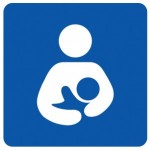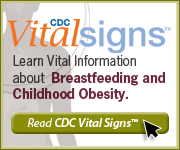healthy kids & families
Breastfeeding
 Breastfeeding is the first step to a healthy life. In addition to the bond created by the intimacy of breastfeeding, we now know that the more a mother breastfeeds, the greater are the benefits to both mother and baby. The American Academy of Pediatrics and the World Health Organization recommend that babies are breastfed exclusively for their first six months of life and to continue for at least the first year and as long as mother and baby desire.
Breastfeeding is the first step to a healthy life. In addition to the bond created by the intimacy of breastfeeding, we now know that the more a mother breastfeeds, the greater are the benefits to both mother and baby. The American Academy of Pediatrics and the World Health Organization recommend that babies are breastfed exclusively for their first six months of life and to continue for at least the first year and as long as mother and baby desire.
Benefits of Breastfeeding
There are many benefits to breastfeeding. Breastfeeding helps mothers and infants alike, keeping both healthier and giving newborns a better chance to thrive throughout childhood. Studies show that breastfed children have fewer and less serious illnesses, including gastroenteritis, asthma, eczema, and respiratory and ear infections, reduced risk of obesity, and that their total medical care costs are lower than for never-breastfed infants. Adults who were breastfed as babies are less likely to develop risk factors for heart disease such as obesity and high blood pressure. There are benefits for mothers too: women who breastfeed have a lower risk of developing breast cancer, ovarian cancer and hip fractures in later life.
Top 5 Reasons to Breastfeed
1. Breastfeeding is more than just food
Breastfeeding helps mothers bond with their babies through intimate physical contact. Physical contact at the breast places the baby skin to skin and within hearing of their mother’s heart beat (which they have listened to within the womb) and helps newborns feel secure, warm and comforted; babies also are highly attuned to the unique smell of their mother’s milk.
2. Breastfed infants are healthier
Breastfed babies have fewer ear infections, less diarrhea and constipation, fewer and/or milder illnesses like colds and flu, and greater immunity to allergies, asthma, diabetes and some childhood cancers. They also have reduced risk of obesity during childhood and in later life.
3. Breastfeeding is good for moms, too!
Women who breastfeed are healthier throughout their lives. Breastfeeding reduces the risks of some types of ovarian and breast cancers. Breastfeeding requires extra calories, making it easier to lose weight gained during pregnancy. Breastfeeding saves time. There are no bottles to warm and wash. Mother’s milk is naturally clean and warm. Sitting down to breastfeed helps moms rest and regain their strength after pregnancy. Breastfeeding hormones help moms relax and bond with their babies.
4. Breastfeeding saves money
Formula is expensive. Moms who do not breastfeed need to buy bottles and other equipment. Additionally, formula-fed babies typically have higher health care costs than breastfed babies. Bonus: the IRS has now made breast pumps a tax deductible expense!
5. Breastfeeding helps the environment
Breastfeeding is natural. It reduces the pollutants created as byproducts during the manufacturing of formula and its packaging. It also reduces the burden on our landfills – no wrappers, cans, bottle liners, etc.
Breast is Best Video
http://www.youtube.com/watch?v=LDl3SDfomk8&list=FL5RRcBUwhRmNkZY9yEjcFXQ&index=3&feature=plpp_video
Local Support!
Though breastfeeding is natural to babies- who marvel us by moving to the breast soon after birth, it is new territory to a beginning mother and you may need additional assistance and support. Ventura County offers a wealth of local resources to support breastfeeding because we know that breastfeeding is what is most healthy for both babies and moms.
Need help right away?
The Breastfeeding Coalition of Ventura County offers a comprehensive Ventura County Breastfeeding Resource Directory of local breastfeeding resources and support, including:
 Lactation Consultants
Lactation Consultants- Breastfeeding Support Groups
- Local La Leche Leagues and community breastfeeding networks
- Hospital/ Clinic Lactation Support Services
- Public Health home visitation nurses
- WIC Breastfeeding counselors and clinics
Phone support
The Breastfeeding Support Line of the Nan Tolbert Nurturing Center is staffed by local lactation professionals and offers free phone support and breastfeeding consultation by appointment. Call 805-646-7559
The National Breastfeeding Hotline is available 24 hours/ day. Talk with a trained breastfeeding peer counselor in English or Spanish. Call 800-994-9662 (TDD 888-220-5446) for support!
In-person Lactation Support
In-person lactation support is available through Ventura County’s local hospitals, clinics, independent lactation consultants (see the Breastfeeding Resource Directory above) and the community organizations, including:
- The New Parent Resource Center, Community Memorial Hospital: 805-667-2838 or 805-652-5052 after hours
- The Center for Family Health’s Breastfeeding Clinic, Ventura Ashwood Location: 805-658-5800
- The Nan Tolbert Nurturing Center: 805-646-7559
- Ventura County Health Care Agency: 805-654-7641
- Mothers Guild: 805-667-2115
- WIC Nutrition Program: 805-981-5251 (bilingual support)
How to Get Started
Be prepared. Don’t wait to learn about breastfeeding until your baby is born and ready to nurse. Join a local breastfeeding class so that you know what to expect. Contact Mothers Guild and the Nan Tolbert Nurturing Center for in-depth prenatal breastfeeding classes. Introductory breastfeeding classes are provided at all Ventura County hospitals.
Breastfeeding should begin as soon as possible after birth, usually within the first hour. Newborns should be nursed whenever they show signs of hunger—approximately eight to twelve times every twenty-four hours. The amount of time for each feeding varies widely for each mother-baby pair: It may be anywhere from ten to forty-five minutes in the first few weeks. Contact a local lactation consultant or breastfeeding group to support you in your first weeks.
Returning to Work
Breastfeeding not only benefits your child, it benefits you and your employer as your child stays healthier during their first year and you continue this important bond. The health care reform bill mandated for the first time that employers with more than 50 employees be responsible for providing a private place for breastfeeding moms to pump their milk at work. Click here to go to our Workplace Lactation page.
Step by Step Latch Video
http://www.youtube.com/watch?v=Zln0LTkejIs#!
Additional Breastfeeding Resources
 For more step by step support and in-depth breastfeeding information, see these excellent links:
For more step by step support and in-depth breastfeeding information, see these excellent links:
American Academy of Pediatrics
Healthychildren.org
KellyMom Breastfeeding Forum
La Leche League
National Women’s Law Center
Womenshealth.gov
Sources: American Academy of Pediatrics, Center for Disease Control and Prevention

